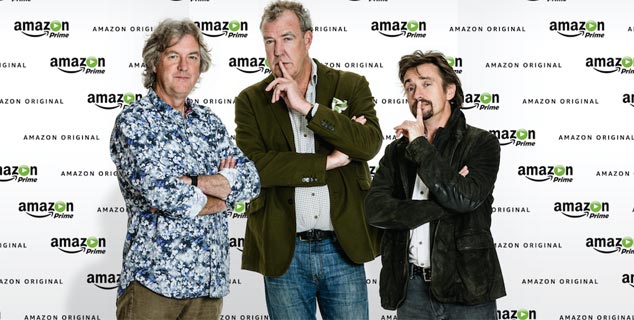
There’s probably no trio in entertainment more controversial than Jeremy Clarkson, Richard Hammond and James May.
Like many people in London, I don’t drive. So watching 45 minutes of TV about cars isn’t my thing.
But you can’t deny that their BBC show Top Gear has a lot of fans. Even after Clarkson punched a producer, a million people signed a petition for him to be kept on.
So, like most people, I assumed that after the trio left the BBC, they would be signed up by Sky or ITV to do a similar show under a slightly different name (the rights to the original title are owned by the BBC).
As expected, they have agreed to do a Top Gear clone. But the way they’ve decided to go about it is quite unexpected – and it’s proof of a dramatic shift in the media industry that smart investors should be taking advantage of…
The old TV business model is breaking down
Clarkson and co haven’t moved to another channel, or even a cable TV service. Instead, they’ve cut a deal with Amazon.
That’s partly for legal reasons – a clause in their contract made it tricky to go and work for another British TV channel so soon. But it also shows just how rapidly the TV landscape has changed.
Once upon a time, you only had terrestrial TV. Then you had satellite and cable for those who were willing to shell out big bucks for premium services like football or the latest films. Then Freeview came along for those who weren’t.
But now all of these services are facing challenges from broadcasters who deliver TV content over the internet. These change the market in two ways: they make it easy for new firms to compete with established providers, and they allow users far greater control over what they watch.
In effect these companies are betting that customers will prefer a more tailored product, rather than a more general service filled with stuff they don’t want.
The market is cottoning on to this quickly. When I went shopping for a new TV recently, they were almost all branded as ‘smart’ devices – internet enabled, so that you could stream content – even the budget models.
Viewers are also changing their habits. One thing keeping US TV executives up at night, for example, is the phenomenon of ‘cable-cutting’, where people cancel their cable services entirely in favour of streaming what they want, whenever they want.
Even those keeping their services are watching less ‘normal’ TV – viewership in the US is falling by around 10%-15% each year.
An epic clash for content
This fight between traditional TV and streaming services is hotting up with Amazon entering the market, which is selling streaming services as part of its Amazon Prime package. Unlike its rival, Netflix, which took a long time to become established, Amazon has huge brand recognition and a large user base, which should help it gain market share.
Amazon is also making its own shows. It recognises that one of the best ways to get customers in this new world of media is to produce content that people want to watch.
The classic example of this is Netflix’s remake of the BBC mini-series House of Cards. The new version, starring Kevin Spacey, has helped to make Netflix a household name.
So Amazon would like a hit like that – and the new show by Clarkson and team is definitely part of that. They’ll also be looking at buying rights to stream shows that have already proved to be hits.
Of course, the networks and cable TV firms aren’t taking this threat lying down. Some are trying to follow the classic strategy of squashing the competition by merging into ever larger firms. In May, for example, Charter Communications agreed a $75bn merger with Time Warner Cable. But this hardly solves the underlying problem – that customers want and can get more choice elsewhere.
So other networks have taken a different approach, bidding more and more for top shows and events in the hope that this will help them to retain viewers.
Studios are king (for now, at least)
So how should you play this?
The obvious decision is to invest on one of the companies involved in streaming. The problem is that they are very expensive, with Amazon (Nasdaq: AMZN) and Netflix (Nasdaq: NFLX) trading at 30 times and 50 times 2018 earnings respectively. There’s also a chance that they will lose out to a new upstart, or their profits take a battering amid the competition to grab viewers.
Instead, the power – and the profitability – in this business has shifted in favour of studios and TV production companies, as platforms (which is ultimately what the streamers, cable companies and networks are) compete to buy their content.
There are many companies in the sector that are worth investigating. One option is Lionsgate Entertainment (NYSE: LGF). This very successful TV and movie studio has a strong exclusive deal with Netflix, which includes the hit TV series Orange is the New Black. Lionsgate trades at a much more reasonable 18 times 2017 earnings.